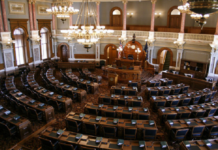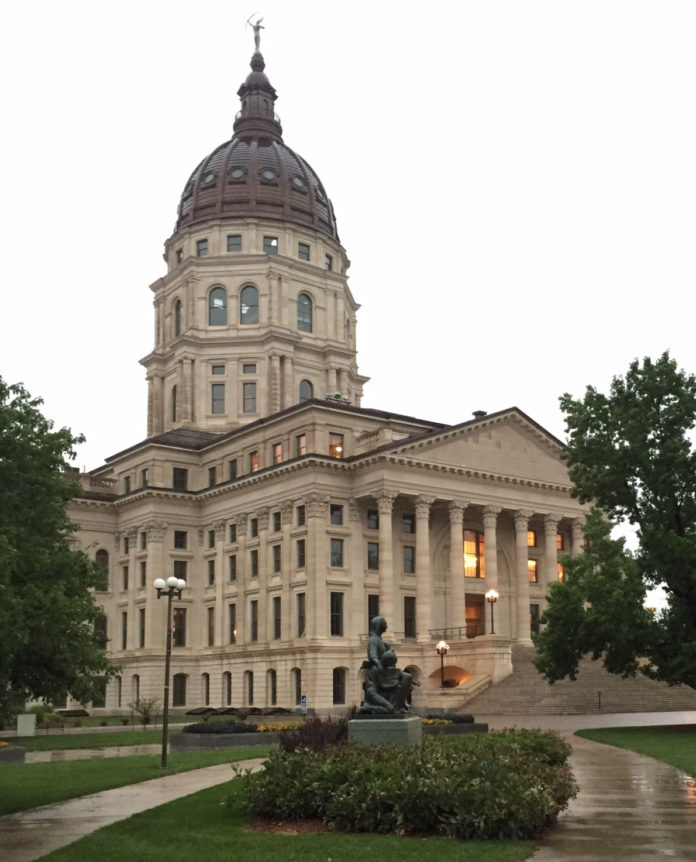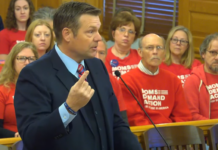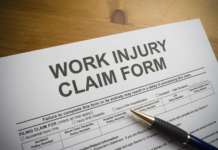A plan emerged in the Senate on Wednesday that would refund property taxes to businesses that face competition from state and local governments.
Republican state Sen. Larry Alley introduced the proposal as the Senate tax committee wrapped up discussion Wednesday morning on a separate bill giving property tax rebates to some businesses that suffered financial losses during the pandemic.
The committee agreed to tack the amendment onto the bill Wednesday afternoon but delayed any action until after the Legislature returns from its spring break.
The latest proposal is a variation of another bill that would exempt private health clubs from property taxes because they face competition from gyms operated by local governments and nonprofits such as YMCAs.
Rodney Steven, the owner of a health club chain and a frequent campaign contributor of legislative campaigns, has renewed efforts this year to get a property tax break for health clubs. He tried something similar about eight years ago and failed.
The plan does not solely address health clubs, but covers any for-profit business that competes at any time during a tax year with the state, county or city government.
The proposal, as now drafted, does not extend to schools, community colleges, universities or technical schools.
Businesses owing any delinquent taxes would not be eligible for the refund. It had been previously revealed that Steven owed thousands of dollars in unpaid property taxes.
Businesses seeking a rebate under the latest proposal would have to submit their claims with the state, the county or the city that’s running the competing enterprise.
Each government would have up to 90 days to decide the eligibility of the applicant and 30 days to refund or credit their property taxes.
It would not start until 2023 and would sunset after one year.
The proposal would be limited to for-profit businesses that were in existence before the state, county or city started offering the same service for a fee.
“The intent of this to kick off that any government entity – city, municipal or state – that is competing against a private industry shall be responsible for that rebate in their tax juridisction,” said Republican state Sen. Caryn Tyson, chair of the tax committee.
The bill could have been applied to something as small as the Capitol snack bar or to something as potentially broad as a municipal golf couse.
Republican state Sen. Molly Baumgardner questioned whether the Senate committee had enough information to make a decision on the proposal.
“While I am not going to say that I am opposed to this, I will say that we have no information as far as breadth and scope,” Baumgardner said. “Does anyone know the scope of this amendment?”
The amendment was attached to legislation that would give property tax rebates to some businesses with yearly revenues between $10,000 and $2.5 million and did not receive more than $150,000 in federal COVID-19 relief aid.
Democratic Sen. Tom Holland and Republican Sen. Mark Steffen sponsored the underlying bill, which targets relief for businesses that were shut down or had their operations restricted during the pandemic.
Their bill excludes a number of businesses such as grocery stores, retail liquor stores, hospitals and health care providers, professional services, finance services and telecommunication companies.
The rebate amount would be capped at $7,500 with the counties responsible for picking up a third of the cost of all claims made for relief. The state would pick up the remaining two-thirds of the cost of the claims.
The proposal spells out a formula using the number of days a businesses was shut down or had its operations limited.
“This is not a way for the Legislature to call out the state or local units of government,” Holland said.
“It’s basically just the state and local units of government recognizing that businesse were adversely affected by COVID,” he said.
Holland said his proposal is not meant to undercut a separate proposal that would direct COVID-19 relief money coming to the state to settle legal claims against the state for business shut downs during the pandemic.
“I’m not trying to head that off,” he said.
A bill introduced at the end of March calls for allocating 25% of federal COVID-19 relief funding going to the state and local governments to offest financial damage suffered by businesses affected by stay-at-home orders during the pandemic.
It was drafted by lawyers of a Sedgwick County gym suing the state for compensation after it was forced to close and operate under restrictions imposed during the pandemic.
The attorney general would be responsible for administering those funds set aside for business closures. He would decide how the money would be parceled out.
Claims would be filed with the attorney general, who would use six factors in deciding how to award claims, including the nature and duration of the government’s “commandeering or use” of the property and how much money was available.
Businesses would need to file a claim by Dec. 31, 2022, for it to be considered.
Lawyers for the Sedgwick County gym went to court, arguing that it’s entitled to compensation under current state law because the government assumed use of the property as it undertook efforts to contain the spread of the virus.
The lawsuit contends the gym owner is entitled to compensation under the state’s emergency management law, which provides compensation for the taking or use of property if it is “commandeered or otherwise used in coping with a disaster.”
Omega Bootcamps and its owner, Ryan Floyd, reached an agreement with the state to delay the case so legislative changes could be considered that would allow for a consistent statewide process for considering these types of compensation claims.
The Judiciary Committee heard testimony on the bill but didn’t act on the proposal.
















